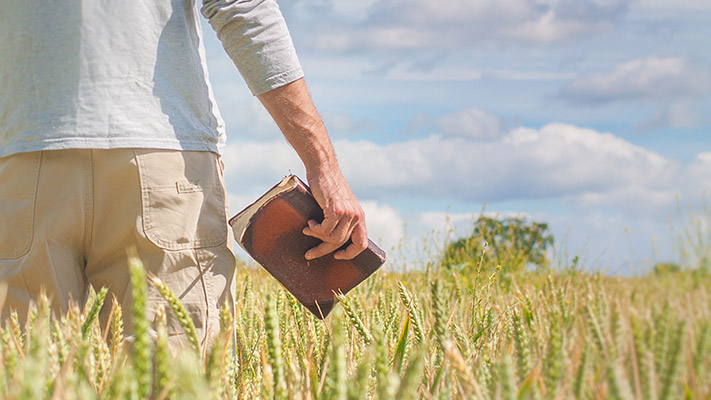 |
Pentecost celebrates the harvest of souls that has continued through the ages.
E. Allen Sorum
Jesus promised to send the Holy Spirit to help his church testify about him, but he told his disciples to wait in Jerusalem. Ten days later Jerusalem was packed with religious tourists who had gathered to celebrate the Festival of Weeks. This festival got its name because God directed his people to count off seven weeks after the first day after the Passover Sabbath and on the day after—50 days later—to gather for a “sacred assembly.” On this 50th day, the assembly presented grain offerings to praise God for the grain harvest. The story of Pentecost is the amazing outpouring of the Spirit upon Jesus’ disciples in Jerusalem.
God likes to illustrate his teachings to his people through familiar things. God’s Word uses yeast to help us appreciate some beautiful features of the Festival of Pentecost. We know that yeast is the leavening agent in dough that causes it to rise. Because yeast makes a loaf of bread soft, fluffy, and delicious, it gives us glorious insight into the Day of Pentecost.
The Passover: Without yeast
But first let’s step back to the Passover, the first sacred assembly in the Old Testament church. Passover was the first day of the weeklong Festival of Unleavened Bread. This was bread without yeast—flat bread. For the entire week of this festival, God required his people to eat only unleavened bread. Additionally, God wanted every bit of yeast swept out of every Hebrew home! Eating crackers instead of bread for a week was probably not a severe sacrifice. Regardless, anyone caught eating a raised loaf of bread or ignoring the “no yeast” rule was cut off from the community!
Avoiding leaven for a week every year helped God’s people remember how God rescued them from slavery. The first Passover meal was eaten in haste because the tenth plague finally broke Pharaoh. The firstborn all died except in those houses that had the blood of the lamb swabbed over the doorposts. Pharaoh let God’s people go. It was a sudden reversal. God told his people to be ready to leave. They would have no time for bread to rise. Excited ex-slaves pushed bitter herbs into dough, pressed it onto a hot surface, and ate it with their bags packed and travel clothes on. The Passover without yeast reminded God’s people of the urgency of escape and the hard journey ahead. Yes, it was a hard journey, but it also was a new beginning, a new freedom, and the anticipation of the new Promised Land.
But there was another lesson. Yeast permeates the dough. At the Passover, God wanted homes swept clean of yeast. This picture might make us think of Jesus’ words to his disciples, “Watch out for the yeast of the Pharisees” (Mark 8:15). Paul described false teaching as yeast that “works through the whole batch of dough” (Galatians 5:9). Yeast is a picture of a strong, pervasive, and penetrating influence. The picture helped the Hebrew people see the true nature of sin, hypocrisy, and pride in human things. These sins were a threat to the assembly’s unity with God and with each other. The worldly influence of Egypt was to be left behind. So God commanded no yeast.
Pentecost: With yeast
Pentecost was different. The people had been counting days: seven weeks and one day. During these weeks, they were preparing for the harvest. On the 50th day, all God’s people from every place gathered in a “sacred assembly” (Leviticus 23:21) to praise God for the harvest. God commanded, “From wherever you live, bring two loaves made of two-tenths of an ephah of the finest flour, baked with yeast, as a wave offering of firstfruits to the LORD” (Leviticus 23:17). The prominent act of worship for this joyful gathering was to pick up two loaves of leavened bread—the fun, fluffy flavor—and wave them before the Lord. The waving the bread before the Lord was a way to acknowledge God as the giver of the grain harvest used to make the bread. Then the Levites actually got to take the bread home to feed their families.
Note the two loaves. We might say it’s a doubly generous gift offered to God for his doubly generous harvest. What an appropriate way to praise God for his sustaining gifts! And what a joyful community celebration, as all of God’s people would share their common blessings and give testimony to their spiritual unity. They were all members of God’s holy nation; a royal people; a people belonging to God; a people who, by virtue of this sacred assembly, declared God to the nations.
The harvest in Jerusalem
Two thousand years ago, God chose this festival for the outpouring of the Holy Spirit. From all over the Mediterranean world, God’s people gathered in Jerusalem: “Parthians, Medes and Elamites; residents of Mesopotamia, Judea and Cappadocia, Pontus and Asia, Phrygia and Pamphylia, Egypt and the parts of Libya near Cyrene; visitors from Rome (both Jews and converts to Judaism); Cretans and Arabs” (Acts 2:9–11).
They had gathered to celebrate a harvest. But on this harvest festival, they became the harvest. The New Testament church on earth began, and it was given a mission. The Holy Spirit was poured out. The gospel of Jesus was proclaimed. Timid disciples became international evangelists. Thousands of spiritual loaves that made up the one loaf of Christ’s church were brought into a joyful unity with God and, in spite of their various origins and languages and differences, into a joyful unity with each other. This was an abundant harvest from a generous God through his powerful gospel.
Our Pentecost
When we gather together in sacred assembly to celebrate Pentecost, we continue the celebration of God’s gracious preservation and also God’s harvesting of souls. Today this celebration commemorates a harvest of precious human souls through the preaching of the gospel. It is a celebration of a great harvest that “no one could count, from every nation, tribe, people and language” (Revelation 7:9).
We are part of this leavened loaf that honors the power and generosity of God’s grace in Jesus. By Jesus’ sacrifice on the cross and by the shedding of his holy blood, he has saved us for himself. He has made us one with God in heaven. And he has made us one with all those who have been harvested before us, with us, and after us.
The harvesting continues. Wave a symbolic pair of delicious leavened loaves to God! Praise him because he has made us part of his people and given us all a mission to share the gospel. Praise him for the witness of our congregations, Lutheran elementary schools, and early childhood centers. Praise him for our worker training schools that prepare harvesters for the harvest fields. Praise him for the harvesting of our 41 WELS missionaries overseas. Praise him for the witnessing of our Pastoral Studies Institute pastors who are leading our church body into brand new outreach opportunities in Bangladesh, Ethiopia, Kenya, Thailand, Vietnam, and more! God is generous. He is worthy of praise.
Pentecost is not over. The harvest is on!
Author: E. Allen Sorum
Volume 106, Number 6
Issue: June 2019







